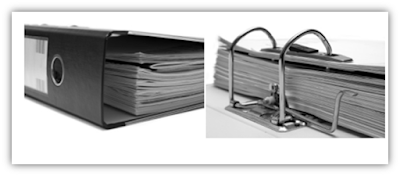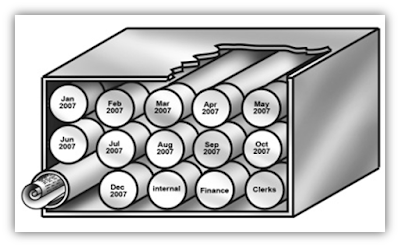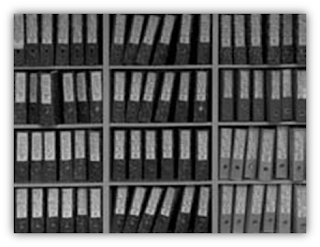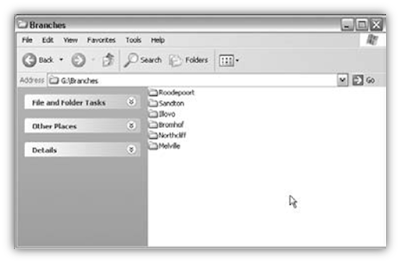Determining The Storage And Retrieval Systems For a Specific Document.
Filing methods. Documents can be filed using one of the following methods:
• tubular filing
• horizontal filing
• lateral filing
• vertical filing
• computer filing.
In tubular filing, large documents are rolled up and placed in a cylindrical tube. The name of the document is written on the lid of the tube, which is then stored in an upright or horizontal position.
Horizontal filing is where one document is placed flat on top of another.
Lateral filing is when files are attached to each other and suspended (hung) on a rack. The files that are attached to each other are not removable. A second removable file is placed inside the hanging file. If a file is needed it is removed from the rack. Filing can be done from the front of the cabinet or from the top of a drawer.
Vertical filing is the most common way of filing. The documents are placed in files or covers and these are placed vertically (upright) in a cabinet, in drawers, or hung on shelves. Files are arranged in a specific sequence.
Folder, suspension (hanging) or cardboard (box) file These are cardboard files in which records are placed. There are various kinds available; some have protruding tabs on which record names are written.
Spike files
A folder with protruding tab and box files This is a base with a steel spike onto which documents are pinned. Spike files have limited use and are normally used for keeping telephone messages or notes.
Box files
Box files (also called lever arch files) have a clasp that clips the documents together. This is the most popular type of file found in the office environment.
Concertina files
A concertina file looks like a book case or a box file with compartments or divisions marked with the letters of the alphabet, numbers or months of the year, depending on what the file will be used for.
Wall files or clipboards
The clipboard is made of hardboard with a clip attached at the top to pin documents onto the board. They are usually used when documents need to be carried around, for instance, on a building site or for meetings.
Filing methods. Documents can be filed using one of the following methods:
• tubular filing
• horizontal filing
• lateral filing
• vertical filing
• computer filing.
In tubular filing, large documents are rolled up and placed in a cylindrical tube. The name of the document is written on the lid of the tube, which is then stored in an upright or horizontal position.
Horizontal filing is where one document is placed flat on top of another.
Lateral filing is when files are attached to each other and suspended (hung) on a rack. The files that are attached to each other are not removable. A second removable file is placed inside the hanging file. If a file is needed it is removed from the rack. Filing can be done from the front of the cabinet or from the top of a drawer.
Vertical filing is the most common way of filing. The documents are placed in files or covers and these are placed vertically (upright) in a cabinet, in drawers, or hung on shelves. Files are arranged in a specific sequence.
Storing records on a computer
Any records that exist in electronic format can be stored on the hard drive of a computer, for example, invoices, credit notes, correspondence, contracts, reference manuals, order information, customer records, employee records, stock records, price lists, sales statistics, etc. Printed records can be converted into an electronic format using a scanner and then stored on a computer. Computerisation makes the retrieval of records easier and faster than manual procedures.Methods of paper-based storage
The following are examples of the different methods of filing and storing documents:Folder, suspension (hanging) or cardboard (box) file These are cardboard files in which records are placed. There are various kinds available; some have protruding tabs on which record names are written.
Spike files
A folder with protruding tab and box files This is a base with a steel spike onto which documents are pinned. Spike files have limited use and are normally used for keeping telephone messages or notes.
 |
| Box files |
Box files (also called lever arch files) have a clasp that clips the documents together. This is the most popular type of file found in the office environment.
 |
| Concertina files |
A concertina file looks like a book case or a box file with compartments or divisions marked with the letters of the alphabet, numbers or months of the year, depending on what the file will be used for.
 |
| A clipboard or wall file |
The clipboard is made of hardboard with a clip attached at the top to pin documents onto the board. They are usually used when documents need to be carried around, for instance, on a building site or for meetings.
Related Posts

Subscribe Our Newsletter




How many of us actually enjoy the spring cleaning season? Sure, it feels great to have the clutter taken care of and all of the open space renewed in your home but how many of us truly enjoy the back breaking labor of clearing out the garage, the basement, the attic, the closets, the kitchen... all of those spaces can be overwhelming when you have too much stuff and not enough storage organizers. cheap trash cans
ReplyDeleteI found so many interesting stuff in your blog especially its discussion. From the tons of comments on your articles, I guess I am not the only one having all the enjoyment here! keep up the good work... packing moving companies in dubai
ReplyDeleteLoved their attention to detail. moving companies edmonton
ReplyDelete